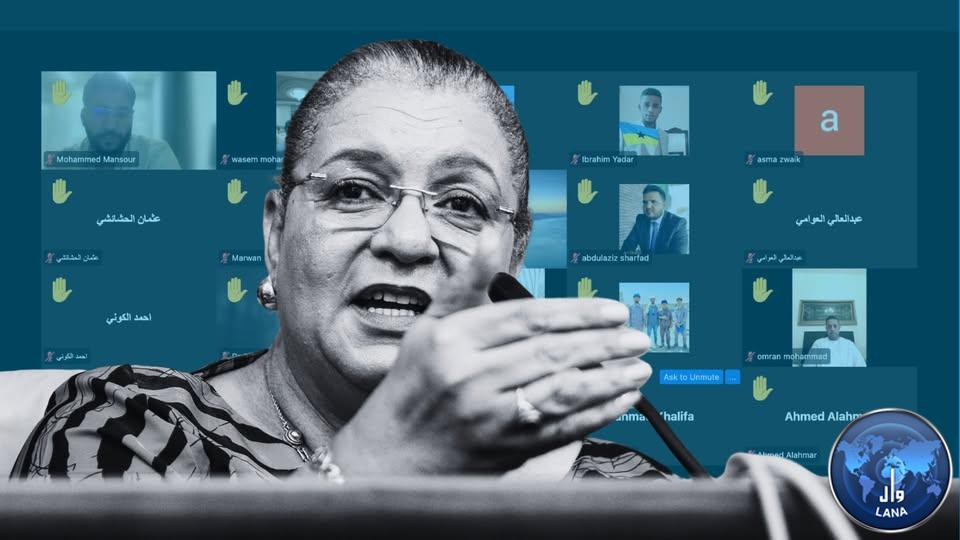Tetteh: Forming a unified government will be part of the negotiations on the roadmap
Pulbished on:
Tripoli, August 2, 2025 (LANA) - The Special Representative of the Secretary-General for Libya (SRSG), Hannah Tetteh, said that the Advisory Committee recommended in its report submitted to the Mission the necessity of forming a unified government before the elections. This issue was present in all of the Mission's public consultations. We believe that having a unified government is important, and how this government is formed will be part of the negotiations on the roadmap. Our conclusions will be based on public opinion through the survey and the results of other consultations.
This came during her participation in an open dialogue via Zoom with 239 Libyan participants, the second of its kind in the past month. The dialogue addressed several issues, including options for holding elections, potential accountability mechanisms for those who obstruct the process, and ways to enhance the participation of women, youth, and persons with disabilities in the political process.
The Mission indicated that since last May, it has conducted face-to-face consultations with approximately 1,000 people across the country, and another 1,250 online, including focused meetings with community leaders, women, and youth. Trade unionists, cultural groups, and persons with disabilities. She indicated that until August 9, the mission is allowing the public to participate in a survey on the proposals presented by the Advisory Committee, a body of Libyan experts in legal, constitutional, and political fields formed by the mission to advise on the best ways to overcome the political stalemate and unify state institutions.
During a dialogue yesterday, Friday, the Special Representative said, "Everyone has a role to play in the success of any political process." She called on Libyans to participate in the online survey and work with the mission after the announcement of the roadmap to hold their leaders accountable for its implementation. She added, "This situation has been prolonged, and changing it requires a collective effort. Democracy and inclusiveness are not fleeting events, but rather processes that take shape over time."
According to the mission, some participants during the Zoom meeting expressed concern that many paths leading to elections had been tried before without success. They believed that the only way forward was to establish a constituent assembly through a national dialogue forum to appoint a new government to oversee the elections. Others supported holding simultaneous presidential and legislative elections and adopting a "constitution first" approach.
One participant was quoted as saying, "We have no confidence in the current bodies, and they must be removed for any roadmap to succeed. They are the ones prolonging the crisis and creating problems."
Another participant said, "The real power lies not in the hands of political bodies, but in the hands of armed groups. How can we achieve democracy with these forces on the ground?" Others shared her concerns, noting that the security situation was unsuitable for holding elections.
Regarding questions from several participants regarding "Will sanctions deter obstructionists?" the Special Representative noted that the Advisory Committee recommended in its report to the mission the formation of a unified government before the elections, and that this issue had been present in all of the mission's public consultations. She said, "We believe that having a unified government is important, and how this government is formed will be part of the negotiations on the roadmap." What we conclude will be based on public feedback through the survey and the results of other consultations."
Tetteh emphasized, however, that the path to institutional change is through elections, and that the goal is to move from the "transitional" phases to the "elections" phase, which will produce a leadership with a popular mandate that bears responsibility for Libya's future and is accountable to the Libyans.
She added: "In developing the roadmap, the question is how to reach the elections and what must be done to ensure they are conducted safely. She explained that there are parties that believe their interests will be severely harmed if the elections are held, and therefore their incentive will be to obstruct them, which could jeopardize the process. Therefore, we must take these challenges into account and work to manage them effectively."
The Special Representative reviewed some of the Advisory Committee's proposals for addressing obstacles that have previously prevented elections, including establishing a legal framework that clearly resolves issues related to the timing of elections and candidacy requirements.
She said: "The legal framework also includes provisions on sanctions and addresses some security issues—not all of them, as some require addressing them on the ground—but it contributes to creating the conditions for this. necessary for successful elections."
The mission noted that one participant asked about the mission's efforts to promote the rights of persons with disabilities, while another questioned the existence of guarantees for youth participation in the political process. One woman expressed concern about the difficulties facing women seeking political participation, describing her experience as a candidate in the municipal elections as "terrifying."
She said, "I was subjected to indirect threats, smear campaigns, the misuse of my personal images on social media, and even direct threats in person. Some individuals pressured me to withdraw from running."
The Special Representative responded, "I thank you for your courage, and I would like to emphasize that Libya needs not only you, but all Libyan women to participate in the discussion about their country's future and contribute to decision-making on how to achieve that future." Sometimes, some people think that women's voices are unwelcome, but women's participation is not a competition with men; rather, it is an essential contribution to the development of society."
She added that the mission's goal is not limited to supporting women's voices, but also includes representing the interests of all segments of society—including persons with disabilities, youth, and cultural components—in negotiations on the political roadmap.
...(LANA)...




